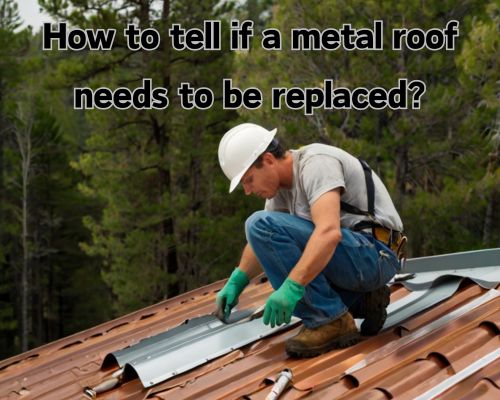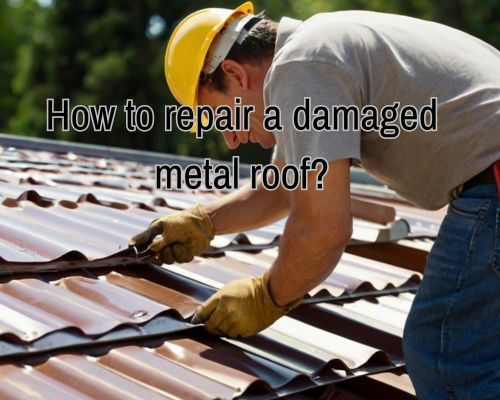How to Tell If a Metal Roof Needs to Be Replaced in New Jersey, USA
A metal roof can be a durable and cost-effective solution for homeowners in New Jersey. However, even the toughest materials can wear out over time due to the state’s diverse weather conditions—ranging from snow-packed winters to humid summers. If you’re wondering how to tell if a metal roof needs to be replaced, this guide offers practical insights while focusing on key factors specific to New Jersey’s climate and housing trends.

1. Common Signs That a Metal Roof May Need Replacement
a. Visible Rust and Corrosion
New Jersey’s coastal regions, such as Atlantic City and Cape May, experience high salt content in the air, which can accelerate metal roof corrosion. Rust spots or flaking metal are strong indicators that your roof may be nearing the end of its lifespan.
b. Leaks or Water Damage
Leaks are a common issue, particularly after heavy rainstorms or snowmelt. New Jersey homes in areas like Bergen County or Passaic County often face water damage in attics caused by failing roof panels or compromised seams. If you notice water stains on ceilings or walls, your roof could be failing to protect your home.
c. Warping or Buckling Panels
Metal roofs should lay flat against the underlayment. If you see panels that have warped or buckled, this could indicate structural damage or a weakening due to weather-related expansion and contraction—a common occurrence in New Jersey’s seasonal climate.
d. Missing or Loose Fasteners
Over time, the screws and fasteners that secure the roof can come loose. Strong winds, common along the Jersey Shore, may exacerbate this problem. Missing fasteners can lead to structural instability and require immediate attention.
2. Lifespan of Metal Roofs in New Jersey
Metal roofs are known for their longevity, often lasting 40-70 years depending on the material. However, factors like improper installation, lack of maintenance, or severe weather can shorten this lifespan. In New Jersey, older homes in regions like Trenton or Newark may still have metal roofs installed decades ago that are now due for replacement.
Materials Matter
- Steel Roofing: Popular for its affordability, steel roofs in New Jersey typically last 40-50 years with proper care.
- Aluminum Roofing: Highly resistant to corrosion, aluminum roofs can last up to 70 years, especially in coastal towns like Asbury Park.
- Copper Roofing: While aesthetically appealing, copper roofs are prone to patina but can endure for over 70 years.
3. Key Factors Specific to New Jersey
a. Climate Impact
New Jersey’s mix of hot summers and freezing winters can take a toll on metal roofs. Ice dams, formed during winter in areas like Sussex County, can damage the roof’s edges and underlayment. On the flip side, summer heatwaves can cause thermal expansion, leading to gaps or cracks in the roofing material.
b. Coastal Challenges
Homes near New Jersey’s shorelines face added challenges like high humidity, salt exposure, and frequent hurricanes or Nor’easters. For example, houses in towns like Wildwood may see more rapid wear on their metal roofs compared to inland properties.
c. Local Building Codes
Before replacing your roof, familiarize yourself with New Jersey’s building codes. In regions like Camden or Jersey City, compliance with energy efficiency and wind resistance standards is critical. For professional work, see https://cjcommercialroofingnj.com/.
4. When to Repair vs. Replace Your Metal Roof
Repair If:
- Damage is localized (e.g., a few rust spots or small leaks).
- The underlying structure is sound.
- Roof panels are less than 15 years old.
Replace If:
- Multiple panels show signs of corrosion or warping.
- The roof is over 30-40 years old.
- Structural damage, like sagging, is apparent.
Consult with a professional roofing contractor in New Jersey to evaluate the extent of damage. Experts from local companies, such as those in Edison or Princeton, can provide guidance tailored to your area.
5. Benefits of Replacing a Metal Roof in New Jersey
Replacing your metal roof offers several advantages, particularly in a state like New Jersey where homeowners value energy efficiency and curb appeal.
a. Increased Energy Efficiency
Modern metal roofs are often coated with reflective materials that reduce heat absorption, making them ideal for New Jersey summers. Energy-efficient roofing can also help you save on cooling costs, which is especially beneficial in high-cost areas like Hoboken or Morristown.
b. Enhanced Weather Resistance
A new metal roof with proper insulation and sealing can better withstand New Jersey’s diverse weather conditions, from snowstorms in the northwest to thunderstorms in the south.
c. Improved Home Value
In competitive real estate markets like Montclair or Summit, a well-maintained or new metal roof can boost your home’s resale value. Buyers appreciate the longevity and durability that metal roofing offers.
6. Cost of Replacing a Metal Roof in New Jersey
The cost of replacing a metal roof can vary based on factors like materials, labor, and roof size. In New Jersey, the average cost ranges from $10,000 to $30,000.
Factors Affecting Cost:
- Material Choice: Aluminum and copper are generally more expensive than steel.
- Roof Complexity: Homes with steep slopes or intricate designs, common in New Jersey’s older Victorian-style houses, may incur higher labor costs.
- Location: Prices in urban areas like Newark or Jersey City may be higher due to demand and labor availability.
7. Choosing the Right Contractor
Selecting a licensed and insured roofing contractor, see https://cjcommercialroofingnj.com/, is crucial for ensuring quality work. Look for professionals with experience in New Jersey’s specific climate challenges. Reading reviews and asking for references in your local community can also help you make an informed decision.
8. Tips for Maintaining a Metal Roof in New Jersey
To extend the life of your metal roof and delay replacement:
- Schedule Regular Inspections: Inspect your roof annually, especially after severe weather events.
- Clean Debris: Clear leaves and branches from your roof and gutters to prevent moisture buildup.
- Reapply Coatings: Protective coatings can help prevent rust and improve UV resistance.
Conclusion
Knowing how to tell if a metal roof needs to be replaced is essential for homeowners in New Jersey. From visible signs like rust and warping to specific regional challenges such as salt exposure and extreme weather, understanding these factors can help you make informed decisions about your roof. Whether you live in bustling Newark or serene Cape May, keeping your metal roof in top condition ensures long-term protection and value for your home.
If you suspect your roof may need attention, reach out to a trusted New Jersey roofing contractor for a thorough inspection. With the right care, your metal roof can continue to serve your home for decades to come.
